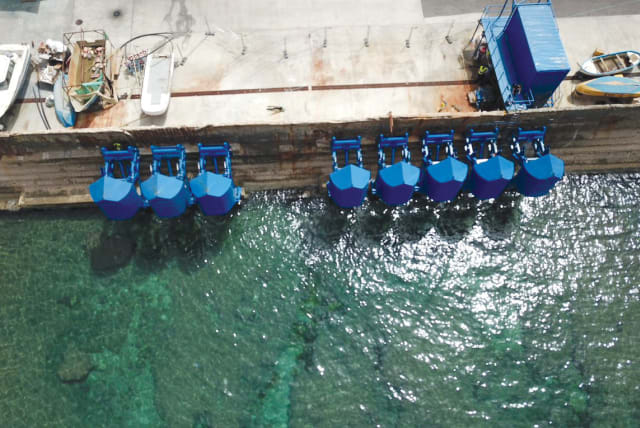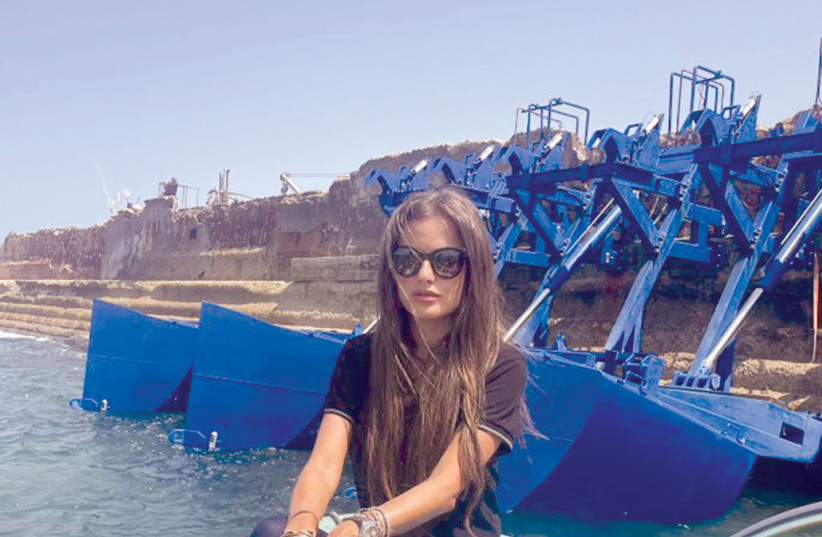Eco Wave Power: The Israeli firm using water waves for renewable energy

Today, Eco Wave is an eco-company with projects in several countries, including a joint partnership with the Israeli government and French National Energy supplier EDF at Jaffa Port
Sitting in the Eco Wave Power headquarters office in Tel Aviv, Inna Braverman, CEO and co-founder, was happy to point out the pictures on the wall. “This one is with Al Gore…and this one was of an official delegation with Bibi [Prime Minister Benjamin Netayahu] to China.”
In one of Israel’s unique examples of innovation start-ups, Braverman’s directly impacts both water and the environment by transforming the waves that splash onto our shores into energy.
Braverman was born near Chernobyl in Ukraine in 1986. Two weeks after her birth, the Chernobyl nuclear disaster occurred. She experienced a clinical death from the aftermath of the fallout. Her mother, a trained nurse, brought her back to life. Ever since, Braverman had a passion to give back. “When I was growing up, at gatherings I was always told, ‘So cool. You had a second chance at life.’ I felt I had to do something meaningful,” she said.
When she was four and fully recovered from the aftermath of Chernobyl, her family made aliyah, among the millions of Soviet immigrants to Israel. Moving to Acre in Israel’s North as a new immigrant, she reflected that her barren but historical landing pad provided fertile ground for new ideas. “There was no cinema there and no shopping mall, as the city was not very developed, so I spent most of my time at the beach. So the vision of how I could make a change, how I could make an impact continued.”
This led her to study political science at the University of Haifa, hoping to become a great politician. “Maybe to make peace in the Middle East, to have this big impact. However, I quickly realized when there weren’t politicians lining up to hire me after I graduated that a change was needed.”
Her change would take place in the world of environmentally friendly start-ups.
Braverman’s opportunity for change came when she met Canadian businessman David Leb. In 2011, they founded Eco Wave. The idea of how to transform waves into energy developed between trips from Ukraine to Israel. The concept soon gained traction, receiving awards from consulting firms Frost and Sullivan and the CNBC Energy Challenge in 2013. In 2014 and 2015, Braverman was invited to attend the United Nations climate change forums, such as the 2015 United Nations Climate Change Conference in Paris. She soon drew the attention of the Israeli government and has been involved in government delegations.
Today, Eco Wave is an eco-company with projects in several countries, including a joint partnership with the Israeli government and French National Energy supplier EDF at Jaffa Port. The company also has active projects in the US and Gibraltar.
The project at Jaffa Port is unique. It is the first time that the Israeli government has invested in wave energy. It has the potential to become a major source of renewable energy, entering the Israeli electrical grid. A venture in operation since 2014, the concept is simple. It uses breakwaters already in place to mount floaters, which utilize the waves splashing against them to bring about a chain reaction. The floaters are connected to pistons which move a hydraulic motor, producing clean energy. The energy then moves to a tank that stores it until the energy produced from the next wave is created.
In 2018, Eco Wave Power was awarded a grant by the Ministry of National Infrastructures, Energy, and Water Resources to expand the pilot station to 100KW and its eventual connection to Israel’s national electrical grid. A partnership with Electricite de France (EDF) was secured a year later. At the time of writing, the project continues, with a PPA (purchasing power agreement) yet to be secured for the Israeli energy market.
“The electricity will be sold to the grid and will be distributed to nearby locations, such as Jaffa Port. A source of clean electricity in partnership with the Israeli government,” Braverman said with a smile.
Later, despite the small size of Israel and its coastline, wave energy can become a major source of power for Israeli households. The key to expansion is to find man-made structures – breakwaters – to attach the floaters to, of which Israel has many, partially due to municipal policy. “There are still many man-made structures that can be used in Ashdod, Hadera, Caesarea, Tel Aviv. Some 250 to 300 MW of electricity (can be produced), which is about 300 000 households,” she explained.
The technology is also innovative in regard to how simple and environmentally friendly it is.
Braverman explained, “What makes this technology better is that it’s smart and simple. An Israeli way of doing things. It is much more cost-efficient than previous technologies, as it uses man-made structures, thus avoiding all the extra costs associated with offshore equipment. Connecting a station off Gibraltar for $400,000, something that would cost competitors $150 million [to build an offshore platform].”
Additionally, she explained, “It is 100% environmentally friendly because, unlike the competition, it doesn’t connect to the seabed but only to existing man-made structures such as breakwaters. While breakwater construction can be taxing on the environment, they are built as a necessity by municipalities anyway, and the mechanisms simply attach themselves to these structures. As such, the mechanism itself causes no damage to the environment.”
However, the road to a world full of wave energy is hardly smooth sailing, especially when it comes to bureaucratic red tape. Braverman explained the process as follows: “The problem is that wave energy is so new that it has never been implemented. Therefore, there is no regulatory framework. Unfortunately, if it takes six months to initiate a project, it can take two years for the legislation to be in place. You go to a licensing committee… they don’t know how to work with wave energy… It takes a very long time for the first one to be implemented. However, once created, it sets a precedent, and the second, third, fourth and fifth become easier.”
The red tape also helps explain that while Israel is a leading start-up hub for ventures such as Eco Wave, at only 8% energy sources from renewable energy Israel lags behind countries in Europe and is behind even the Israeli government’s own stated objective of 17% by 2030.
While funding exists, sources are limited due to a lack of a regulatory framework. Debt financing, which is available for other sources of renewable energy such as wind energy, is not available for wave energy. As such, most funding comes in the form of grants and equity funding, which can be quite limited for expansion.
The second problem relates to the breakwaters themselves. While instrumental for the innovation of using them to collect the waves, there is no regulation in place on construction of breakwaters, with nobody devising legislation and regulations to make them “floater” friendly. “Because of climate change, more and more breakwaters are being built on an annual basis. If there was legislation in Israel that would enforce the construction of breakwaters to make them user-friendly for the floaters, it would be a help. It would be much faster and easier to implement. So instead of a puzzle to install [the floaters and the infrastructure], the breakwaters would be designed user-friendly,” she said.
However, Braverman sees a rosy outlook for the future. Within Israel, she is approaching various municipalities such as Herzliya and Ashdod. “Every new breakwater can open a new market segment (for growth)...covering every existing breakwater.”
Globally, the amount of energy produced can easily outproduce polluted sources of energy. “By 2050, wave energy is expected to produce 10% of all of Europe’s electricity needs…which is 188 gigawatts of power… wave energy can provide 66% of all of America’s energy’s needs,” she said.
A woman with a passion to change the world, Braverman recalled her former home in Ukraine. “The fighting there is scary. There can be a second nuclear disaster there at any time. It just shows why the world should move to a more eco-friendly form of energy.” ■
Jerusalem Post Store
`; document.getElementById("linkPremium").innerHTML = cont; var divWithLink = document.getElementById("premium-link"); if (divWithLink !== null && divWithLink !== 'undefined') { divWithLink.style.border = "solid 1px #cb0f3e"; divWithLink.style.textAlign = "center"; divWithLink.style.marginBottom = "15px"; divWithLink.style.marginTop = "15px"; divWithLink.style.width = "100%"; divWithLink.style.backgroundColor = "#122952"; divWithLink.style.color = "#ffffff"; divWithLink.style.lineHeight = "1.5"; } } (function (v, i) { });


